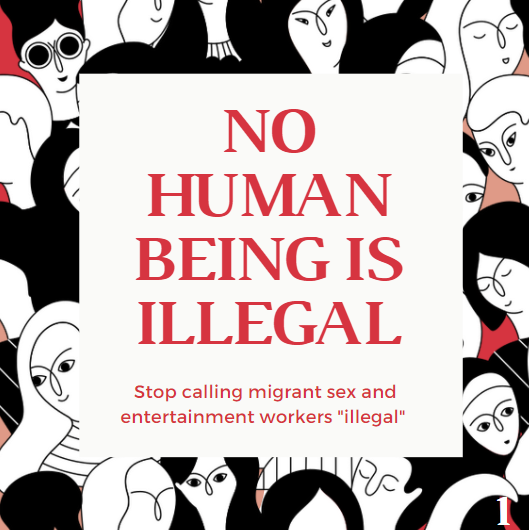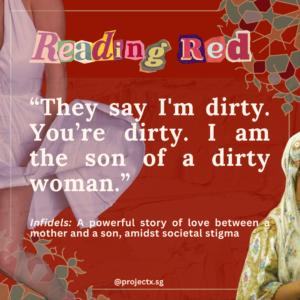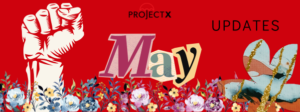Sex workers are routinely situated within contexts of petty crimes, manipulation and sexual deviances. Against the backdrop of Covid-19, criminal constructions of migrant sex and entertainment workers have skyrocketed. Containment narratives associating illegality, nationality and immigration controls further construct migrants as a disorderly population, a “problem” to be tackled once they are caught.
Language is constantly evolving. Socio-political structures of inequality are both reflected and reproduced in everyday discourses, influencing our individual attitudes, social behaviors and policies. The repeated patterns linking deportation, KTV raids, crackdown, illegal sex worker, low-income Asians, visa, temporary, foreign, migrant reveal a negative semantic prosody attached to migrant sex workers and facilitate conditions that can increase their vulnerability to injustices.
Calling a migrant sex and entertainment worker “illegal” is denigrating, derogatory, and factually incorrect. Implying that a human being is perpetually illegal denies their right to mobility and perpetuates material consequences that undermine their social, health and legal protection. We have to do better.
No human being is illegal. The battle for terminology is a battle for dignity, humanity and respect. In this post, we re-examine our ‘common-senses’ and deconstruct ‘illegal’ sex workers.
Ever jaywalked or flouted mask-wearing rules? Are you an illegal person?
We can easily claim the statement as inaccurate and misleading because committing a criminal offense does not make you an “illegal” person, Likewise, it does not render migrant sex workers who enter Singapore through legitimate channels “illegal people.” A country is held responsible to uphold the human rights of all persons under their jurisdiction, regardless of their migrant status or whether they have committed a crime.
Calling migrants sex workers ‘illegal’ is harmful and dehumanising. It delegitimises their lived experiences and entrenches their perceived identity as dishonest, undeserving and criminals. Notably, the term “illegal” criminalizes migrants even when the violation of migration laws is more of an administrative nature rather than a criminal one. Yet, the use of punitive measures to control, contain and punish them often go unquestioned.
It is silencing in preventing a truthful, respectful and informed debate on the realities of global migration. It also increases the barriers to resources and help channels. Furthermore, xenophobic undertones peddling narratives that are morally motivated instead of empirically driven further undermine social cohesion and threaten the bedrock of a democratic society.
If this was a story of a man setting out on an adventure to find a treasure and slay a dragon to make his family rich and safe, he would be the hero. But I am not a man. I am a woman and so the story changes.
I cannot be the family provider. I cannot be setting out on an adventure. I am not brave and daring. I am not resourceful and strong. Instead, I am called illegal, disease spreader, prostitute, criminal or trafficking victim.
Written in the collective voice of Burmese migrant sex workers, Empower Foundation, 2012.
A non-discriminative terminology is ‘irregular migrant’.
In ILO’s 2020 assessment of migrant workers’ protection in Singapore, key recommendations included replacing ‘illegal’ with ‘irregular’ and ‘alien’ with ‘migrant’.
Migrant sex workers should be recognized as irregular labour migrants who cross borders to escape local economic and legal inequalities, to earn higher incomes as breadwinners, work safely, and live where their human rights are respected.
They possess agency, aspirations and capabilities that are often dismissed in today’s moral and political crusade to restrict migration and criminalise sex work. Their identities and decision to migrate are shaped by an intersectional understanding of familial responsibilities, cultural perceptions and rational responses. Perceiving them as ‘illegal’ internalises an “othering” rhetoric that is neither accurate nor neutral, but neglects the pervasive injustices that they confront on a quotidian basis.
We urge you to join us in overturning harmful narratives of illegality and criminality. Here are five ways to be an ally!
- Address your prejudices.
- Our ways of viewing the world are not idiosyncratic and often ‘naturalised” through repetition. Re-examine narratives and your use of language.
- Stand up when conversations happen.
- Talk to sex workers instead of speaking over them. Share perspectives with your friends and families to tackle stigma, bigotry and shame around sex work.
- Be supportive and share resources.
- If you know someone in the industry who needs help, do not be condescending when giving advice. Instead, direct them to organizations with resources.
- Respect sex workers!
- Recognize that sex work transcends visible notions of race, gender, class, nationality, sexuality, education, and identities. We are all human beings.
As sex workers, irregular migrants navigate doubly precarious situations. Greater policy actions to safeguard migration channels and routes, workplace health and safety practices, and address unique challenges of migrant sex workers are imperative to protecting their human rights. Project X is optimistic that reflecting upon dehumanizing rhetoric and terminology to advance the recognition of sex work as a legitimate form of labour.
Show this post some love on Facebook, Instagram, or Twitter.






